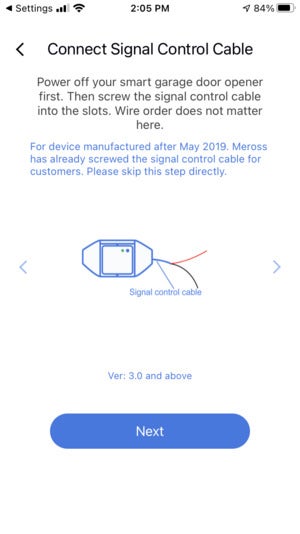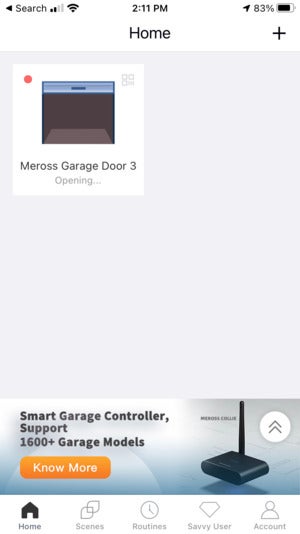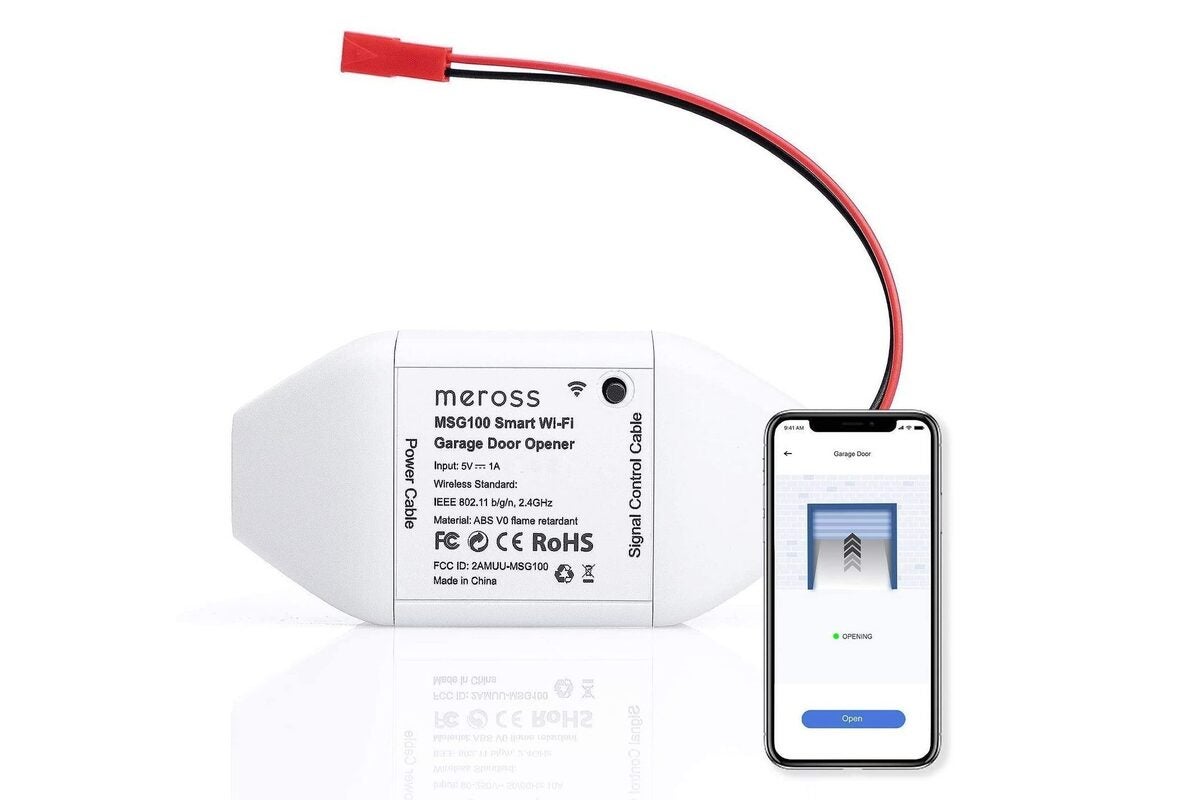If you need a wired controller, Meross’ option should be on your shopping list.
Meross
Today’s Best Tech Deals
Picked by TechHive’s Editors
Top Deals On Great Products
Picked by Techconnect’s Editors
Meross Smart Wi-Fi Garage Door Opener (model MSG100)
Bringing your garage door into your smart home isn’t the simplest process, nor is it the cheapest: Many smart garage door systems—our top pick, the Chamberlain myQ, notwithstanding—will run you $100 or more. And then there’s the hassle of climbing around on a ladder in your garage and dealing with some often janky wiring.
Meross doesn’t do much about the installation headaches—in fact, it’s one of the more labor-intensive openers on the market, for reasons I’ll explain shortly—but it does help out greatly when it comes to price. At a mere $40, it’s the second cheapest smart opener on the market, after the $30 myQ.
This review is part of TechHive’s coverage of the best smart garage door controllers, where you’ll find reviews of competing products, plus a buyer’s guide to the features you should consider when shopping for this type of product.
 Christopher Null / IDG
Christopher Null / IDGLess-than-articulate installation instructions like this might challenge novices.
Like all of Meross’ products, the initial presentation of the device is decidedly understated. A plain white box contains all the individually packaged components, with nothing but a QR code to direct you to setup instructions and the Meross app. You will need those instructions.
All smart garage door openers have compatibility limitations, and Meross’ is no exception. Like all the other wired openers I’ve tested, Meross’ does not work out of the box with newer, more secure openers and requires a special accessory in order to do so.
Meross doesn’t actually sell this accessory; you are directed to email the company to obtain one directly (for free) if the app’s compatibility checker determines your opener isn’t compatible.
As such, it’s probably worth downloading the app and plugging in your garage door model information before you even purchase the product in order to save yourself an extra trip up the ladder in your garage. I ended up installing the device on a slightly older Liftmaster that did not need the accessory. The other two openers in my garage, however, would have required one.
While Meross’ installation instructions are far from perfect, hardware setup is similar in most ways to other smart garage door openers. The opener plugs directly into wall power, and two bare wire leads connect the Meross opener to terminals on the back of the garage door motor, either through screw posts or spring-loaded connectors. Meross throws you for a twist, however, in its choice of door sensor technology, which is used to tell the app whether the garage door is open or shut. While most smart openers use a wireless sensor that mounts to the door and can sense whether it is upright (door shut) or horizontal (door open), Meross instead relies on a two-part magnetic sensor similar to the type used in a home security system.
 Christopher Null / IDG
Christopher Null / IDGA simple in-app animation tells you when your door is in motion.
That’s an interesting idea—except the sensor must connect to the Meross opener via a long wire. You snake this wire along the track, much like you do with the infrared sensors used to determine whether the door opening is blocked, and carefully position the magnets somewhere on the door.
Getting this all situated isn’t the simplest process, because if the sensor wire hits the chain, it can easily rip the whole thing apart. Meross doesn’t provide any accessories to make this easy, so bring some binder clips to make the process a bit cleaner. (Gloves are also a good idea, since the track can be quite oily.)
The good news is that the lack of a wireless door sensor takes one potential trouble spot out of the equation, and the MSG100 need only communicate with your router via Wi-Fi (2.4GHz only) in order to maintain its connection. Setup through the Meross app was quick and error-free in my testing, after which I was able to use the app to freely open and close the door.
Alexa and Google Assistant are both supported, letting you use your voice to operate the controls, and the MSG100 also supports both Samsung SmartThings and IFTTT. A different version of this product (model MSG100HK) supports Apple HomeKit, but it was not available at press time.
I particularly enjoyed the thoughtful additional features in the app, including an “overtime reminder,” which pushes a warning if the door is left open for a user-configured length of time, and the “overnight reminder,” which alerts you if the door is open after hours (at a time you set). You can also set the door to close automatically after it’s been open for a set time, or close at a certain time of day. My only complaint with the app is that it can be slow to respond—opening the door can take 5 to 10 seconds of “thinking” in some cases—but that’s a minor issue. All activity is logged in the app, and push notifications are also sent to your phone for just about everything.
Meross’s installation is more onerous than most smart garage products, but for just $40, one might feel able to tolerate a bit of a headache. If MyQ’s opener doesn’t work for you, this is our second-best recommendation.
Note: When you purchase something after clicking links in our articles, we may earn a small commission. Read our affiliate link policy for more details.
Meross Smart Wi-Fi Garage Door Opener (model MSG100)
Meross’ installation process might stymie novices, but its low price tag—and good performance—merit strong consideration.
Pros
- Very inexpensive
- Solid performance during our testing
- Lots of extra features to ensure you don’t leave the door open
Cons
- Wired door sensor adds complexity
- Virtually no handholding during installation
Christopher Null is a veteran technology and business journalist. He contributes regularly to TechHive, PCWorld, and Wired, and operates the websites Drinkhacker and Film Racket.


